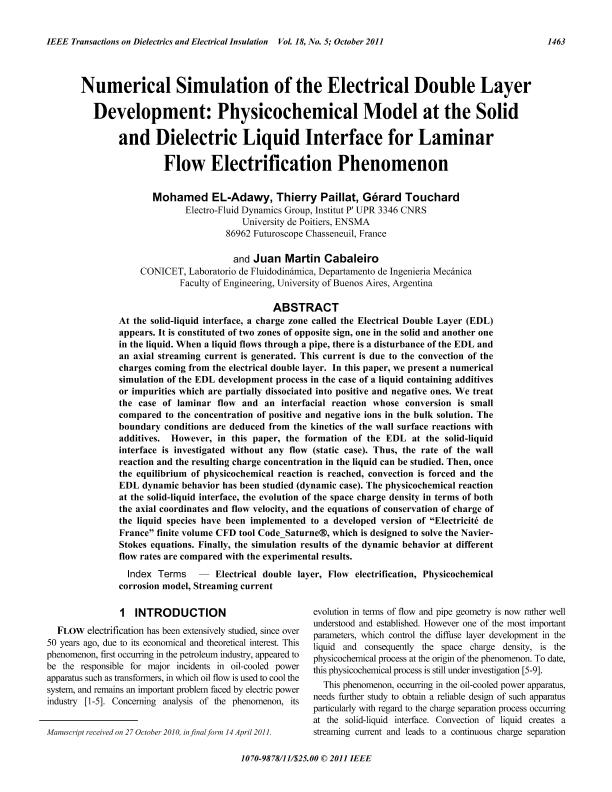Mostrar el registro sencillo del ítem
dc.contributor.author
El Adawy, Mohamed
dc.contributor.author
Paillat, Thierry
dc.contributor.author
Touchard, Gérard
dc.contributor.author
Cabaleiro, Juan Martin

dc.date.available
2023-04-12T11:19:32Z
dc.date.issued
2011-10
dc.identifier.citation
El Adawy, Mohamed; Paillat, Thierry; Touchard, Gérard; Cabaleiro, Juan Martin; Numerical simulation of the electrical double layer development: Physicochemical model at the solid and dielectric liquid interface for laminar flow electrification phenomenon; Institute of Electrical and Electronics Engineers; IEEE Transactions on Dielectrics and Electrical Insulation; 18; 5; 10-2011; 1463-1475
dc.identifier.issn
1070-9878
dc.identifier.uri
http://hdl.handle.net/11336/193359
dc.description.abstract
At the solid-liquid interface, a charge zone called the Electrical Double Layer (EDL) appears. It is constituted of two zones of opposite sign, one in the solid and another one in the liquid. When a liquid flows through a pipe, there is a disturbance of the EDL and an axial streaming current is generated. This current is due to the convection of the charges coming from the electrical double layer. In this paper, we present a numerical simulation of the EDL development process in the case of a liquid containing additives or impurities which are partially dissociated into positive and negative ones. We treat the case of laminar flow and an interfacial reaction whose conversion is small compared to the concentration of positive and negative ions in the bulk solution. The boundary conditions are deduced from the kinetics of the wall surface reactions with additives. However, in this paper, the formation of the EDL at the solid-liquid interface is investigated without any flow (static case). Thus, the rate of the wall reaction and the resulting charge concentration in the liquid can be studied. Then, once the equilibrium of physicochemical reaction is reached, convection is forced and the EDL dynamic behavior has been studied (dynamic case). The physicochemical reaction at the solid-liquid interface, the evolution of the space charge density in terms of both the axial coordinates and flow velocity, and the equations of conservation of charge of the liquid species have been implemented to a developed version of "Electricite de France" finite volume CFD tool Code-Saturne®, which is designed to solve the Navier-Stokes equations. Finally, the simulation results of the dynamic behavior at different flow rates are compared with the experimental results.
dc.format
application/pdf
dc.language.iso
eng
dc.publisher
Institute of Electrical and Electronics Engineers

dc.rights
info:eu-repo/semantics/openAccess
dc.rights.uri
https://creativecommons.org/licenses/by-nc-sa/2.5/ar/
dc.subject
ELECTRICAL DOUBLE LAYER
dc.subject
FLOW ELECTRIFICATION
dc.subject
PHYSICOCHEMICALCORROSION MODEL
dc.subject
STREAMING CURRENT
dc.subject.classification
Física de los Fluidos y Plasma

dc.subject.classification
Ciencias Físicas

dc.subject.classification
CIENCIAS NATURALES Y EXACTAS

dc.title
Numerical simulation of the electrical double layer development: Physicochemical model at the solid and dielectric liquid interface for laminar flow electrification phenomenon
dc.type
info:eu-repo/semantics/article
dc.type
info:ar-repo/semantics/artículo
dc.type
info:eu-repo/semantics/publishedVersion
dc.date.updated
2023-04-11T12:05:47Z
dc.journal.volume
18
dc.journal.number
5
dc.journal.pagination
1463-1475
dc.journal.pais
Estados Unidos

dc.description.fil
Fil: El Adawy, Mohamed. Université de Poitiers; Francia
dc.description.fil
Fil: Paillat, Thierry. Université de Poitiers; Francia
dc.description.fil
Fil: Touchard, Gérard. Université de Poitiers; Francia
dc.description.fil
Fil: Cabaleiro, Juan Martin. Universidad de Buenos Aires. Facultad de Ingeniería. Departamento de Ingeniería Mecánica. Laboratorio de Fluidodinámica; Argentina. Consejo Nacional de Investigaciones Científicas y Técnicas; Argentina
dc.journal.title
IEEE Transactions on Dielectrics and Electrical Insulation

dc.relation.alternativeid
info:eu-repo/semantics/altIdentifier/doi/http://dx.doi.org/10.1109/TDEI.2011.6032817
dc.relation.alternativeid
info:eu-repo/semantics/altIdentifier/url/https://ieeexplore.ieee.org/document/6032817
Archivos asociados
